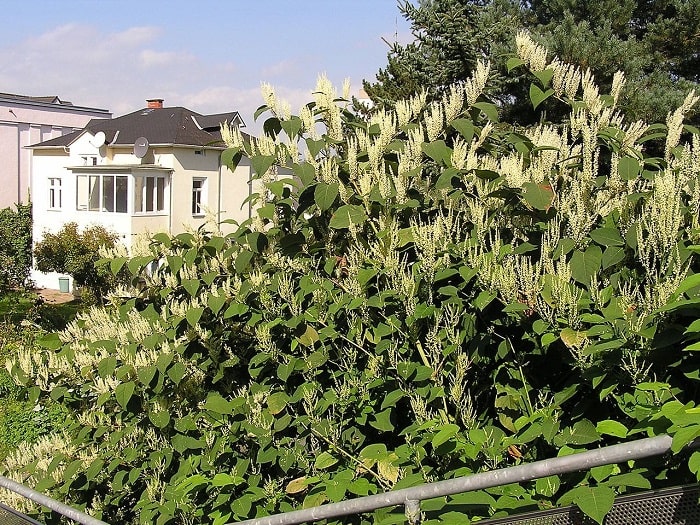Bought a House With Japanese Knotweed? Here’s What to Do.
The process of buying a home is fraught with hazards and potential pitfalls, in fact there are so many that it can be easy to overlook a small patch of vegetation in the corner of a garden, or a seemingly irrelevant question on a TA6 property form.
Unfortunately, it’s often the case that sellers, vendors and even estate agents will attempt to hide, downplay or outright lie about the presence of Japanese knotweed on a property in order to get a sale pushed through and cash in the bank.
Discovering Japanese knotweed on a house that you’ve just bought is not a pleasant surprise and it’s one that can cause a serious amount of anxiety. Even more worrying is discovering a knotweed infestation months, or even years, after moving house: finding the root of the problem can be difficult, let alone chasing down the individuals who have misled you into buying an infested property.
Uncertain if your new house has Japanese Knotweed? Check out our Japanese knotweed image gallery or see our Japanese Knotweed Identification guide.
See our outstanding reviews below to learn about some of the cases we’ve helped win.
If you’ve identified Japanese knotweed on a property that you’ve just bought then it’s imperative that you take action as soon as possible, so that you can find the source of the infestation and determine whether or not you have been lied to or misled in the lead up to the purchase of the property.
We can answer your Japanese knotweed questions!
Talk To UsContents
Should the Japanese knotweed have been declared on the TA6 property information form?
Whether or not the Japanese knotweed should have been declared depends on how you’ve purchased the property.
If you’ve bought your house through the usual conveyancing protocol then it’s likely that the seller would have had to complete a TA6 property form in the lead up to the sale.
This is a legally binding document; lying on it can lead to lawsuits and there is a specific question that relates to Japanese knotweed. This is the seller’s opportunity to give full disclosure about the infestation, should they choose to lie about their knowledge of the knotweed then you may be able to sue them for the cost of treatment and damages relating to the drop in the value of the property.
The seller lied about the Japanese knotweed on the TA6 Property form
If the seller lies about Japanese knotweed affecting the property on the TA6 form then you may be able to claim for compensation on the grounds that the property has been misrepresented to you.
The seller didn’t tell me about the Japanese knotweed – can I claim compensation?
You should be able to claim compensation against buyers who make no attempt to inform you about the extent of the Japanese knotweed infestation.
Japanese knotweed can often damage the value of a home. The severity of the depreciation in value is directly related to the nature of the infestation.
Considering that some mortgage lenders will flat out refuse to lend to property owners who have the plant within 7 metres of their home, it’s unsurprising that so many sellers attempt to hide, lie, or otherwise avoid telling potential buyers about the Japanese knotweed on their property; however, to do so can leave them open to Japanese knotweed legal action.
Can I claim compensation against the previous owner?
If the previous owner of your home has lied to you about their knowledge of Japanese knotweed on the property, or has misrepresented the property by stating that the plant is not on the land, then you may be able to claim compensation for the costs of treating the infestation.
An object to you making a claim for compensation could be losing contact with the previous owner. It’s common for a seller to leave little or no contact details after they’ve sold a property, often because they want to avoid discussing any issues with the home that they’ve avoided mentioning so far. Tracking down the previous owner is an important step in the process of claiming compensation against them.
We can answer your Japanese knotweed questions!
Talk To UsWhat happens when the surveyor misses the Japanese knotweed?
In some cases, you may have opted for a HomeBuyer report in the lead up to purchasing your property. There are different types of reports and surveys that you can opt for in order to get a deeper understanding of the house you’re intending to buy, but the surveyor, or individual compiling the report, is responsible for spotting and investigating potential Japanese knotweed infestations.
Should you discover Japanese knotweed on a house that you’ve recently bought, after a HomeBuyer report or property survey has said otherwise, then you may have recourse to claim against the persons who undertook that individual or company.
Related: Has Your Surveyor Missed Japanese Knotweed?
The previous owner told me about the Japanese knotweed after the purchase was complete.
In some cases, whether as an afterthought or in order to deal with a guilty conscience, a seller may choose to inform the buyer of the presence of Japanese knotweed after the sale has gone through.
Doing so is a direct admission that the seller has misled the buyer and possibly misrepresented the property. Any letters or notes left by the previous seller can be used as evidence in a claim for compensation.
What if the seller answered ‘Not Known’ on the TA6 and said that they didn’t know about the knotweed?
All property owners have a responsibility to ensure that they do not encourage the growth of invasive plants such as Japanese knotweed. However, claiming ignorance of the plant is possible to do if a seller answers ‘Not Known’ when filling in the TA6 Property Information Form. This answer puts the onus on the buyer to commission a Japanese knotweed survey in order to find out conclusively whether it affects the property or not. Removal specialists and experts can help investigate the infestation to tell how long the plant has been present and even if herbicide treatment has already been applied.
We can answer your Japanese knotweed questions!
Talk To UsHow will Japanese knotweed affect my mortgage?
The presence of Japanese knotweed as close as 7 metres to a house can be enough for a mortgage lender to consider you as ‘at risk’.
For years this ‘seven-metre’ rule, put in place by the Royal Institution of Chartered Surveyors, has been used by lenders to refuse mortgages and requests to re-mortgage – however, some lenders are now starting to soften their stance on the matter.
Those who have bought a house with Japanese knotweed should not see their situation as hopeless. There are plenty of treatment specialists who can offer plans that are backed by insurance and accreditations, which can reassure lenders and ease mortgage negotiations.
Can I resell my property with the Japanese knotweed?
Although not without its difficulties, it is possible to resell your property with Japanese knotweed.
As time has passed, buyers have become less squeamish when approaching the purchase of a house affected by the plant, especially when the seller has acted transparently and made efforts to put a treatment plan in place.
Setting up an effective treatment plan is not a cheap solution, but will provide potential buyers with the best reassurance that the infestation is being dealt with and will not prove to be an issue that they will have to remedy during their ownership of the property.
What if there’s Japanese knotweed near the house that I bought?
In some cases, a seller may choose to not mention that there is Japanese knotweed growing outside the borders of the property, but still nearby.
If you have bought a property with the understanding that invasive plants do not affect the land, but then discover that there is Japanese knotweed growing in your neighbor’s garden, it’s possible that the value of your house is less than you paid for it.
Depending on whose information you were acting on, it may be possible for you to claim compensation against the property surveyor or seller for not fully disclosing the nature of the property.
What happens when I find knotweed on my new build?
Recently, we’ve been in discussions with a buyer from a separate case who has been forced to pay £5,000 in fees to a removals agency, after discovering Japanese knotweed on their new build property.
Before moving in they had asked their conveyancing solicitor to enquire about the presence of knotweed who had neglected to make the relevant investigation. We are currently helping them seek compensation for the solicitor’s negligence.
There are strict regulations controlling building on land with Japanese knotweed, developers who choose to ignore these may find themselves liable at a later date. Letting the plant spread whilst construction takes place is an offence and can be punishable with fines or imprisonment.
When should I declare the knotweed on my property?
As a homeowner, it is your legal responsibility to prevent any Japanese knotweed on your land from spreading onto another person’s property or into the wild.
You are not legally required to remove Japanese knotweed from your land, but failing to prevent it from spreading onto neighbouring land is an offence.
It’s also an offence to incorrectly dispose of any knotweed material, for these reasons it’s always best to consult a specialist before making any rash decisions that could worsen the problem and leave you in a precarious legal situation.
If either of these cases sound familiar or you’d like guidance on your own Japanese knotweed problem, then as Japanese knotweed specialists we can provide you with expert advice so please don’t hesitate to contact us using the adjacent contact form or call us direct on 07595 653 226.

